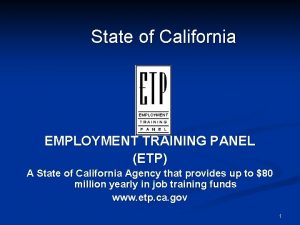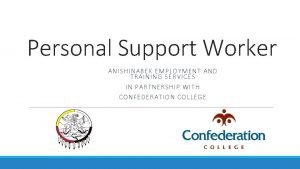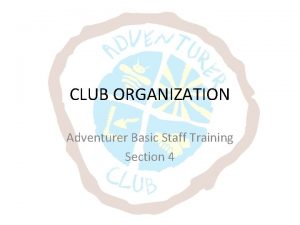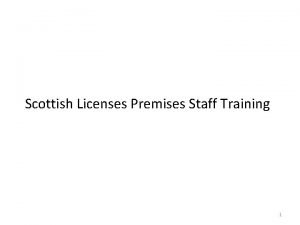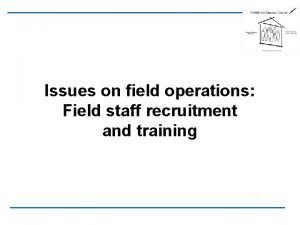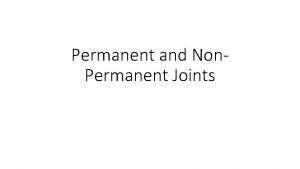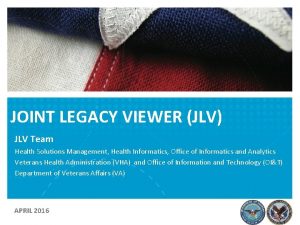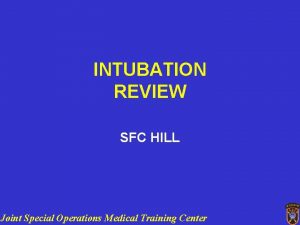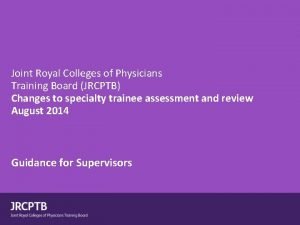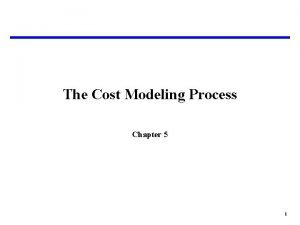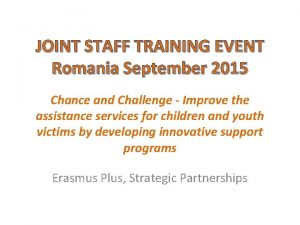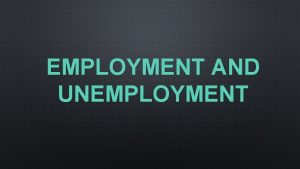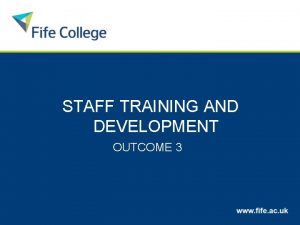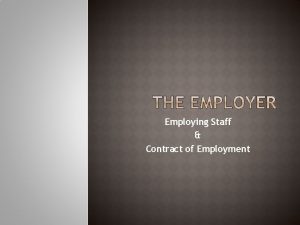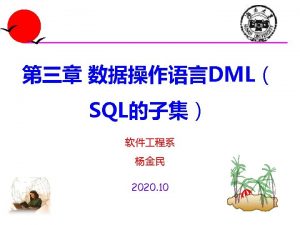Increasing StudentsGraduates Employment Readiness Joint staff training event












































- Slides: 44

Increasing Students/Graduates Employment Readiness Joint staff training event Madrid, 18 -22 May, 2015 Framework for Student & Graduate Internship Programmes This presentation was prepared within the framework of the Strategic Partnership project “GRADual: Increasing Students/Graduates Employment Readiness” (no. 2014 -1 -LT 01 - KA 203 -000645). The project is supported by the Erasmus+ programme which is executed in Lithuania by the Education Exchanges Support Foundation. The contents of this presentation do not necessarily reflect the position or opinion of the European Commission. Neither the European Commission nor any person/organisation acting on behalf of the Commission is responsible for the use which might be made of any information contained in this presentation.

Framework for Student & Graduate Internship Programmes General scope and framework Legal aspects: legislation and agreements Risk prevention Insurance requirements Internship permanence and/or early cancellation Business and acedemic tutors Funding and student stipends Madrid, 18 -22 May, 2015 Joint staff training event 2

Framework for Student & Graduate Internship Programmes General scope and framework Madrid, 18 -22 May, 2015 Joint staff training event 3

General Scope and Framework What is an internship? An internship is a job training for white-collar and professional careers. Internships for professional careers are similar in some ways to apprenticeships for trade and vocational jobs, but the lack of standardization and oversight leaves the term open to broad interpretation. Interns may be college or university students, high school students, or post-graduate adults. These positions may be paid or unpaid and are usually temporary. Generally, an internship consists of an exchange of services for experience between the student and an organization. Students can also use an internship to determine if they have an interest in a particular career, create a network of contacts or gain school credit. Some interns find permanent, paid employment with the organizations for which they worked. This can be a significant benefit to the employer as experienced interns often need little or no training when they begin regular employment. Unlike a trainee program, employment at the completion of an internship is not guaranteed. http: //en. wikipedia. org/wiki/Internship Madrid, 18 -22 May, 2015 Joint staff training event 4

General Scope and Framework The main variables involved …. Students Undergraduate and master degrees Graduates Curricular Paid Extracurricular Unpaid Social Security coverage with or without mobility Private insurance International No coverage Year-round ECTS accreditation No credits awarded Madrid, 18 -22 May, 2015 National Company certification No certification Part-time Full-time 2 to 12 months Academic year 2 to 9 months Summer 2 to 3 months Joint staff training event Academic learning plan In-company training plan Combined or no learning plan Mentored Company and/or academic tutors Non-mentored Sources of funding Types of host organisations 5

General Scope and Framework Challenges faced Increasing employability of young graduates is a clear priority for the European Commission, as well as for European business, higher education institutions, and many other organizations which support and foster schemes with this objective in mind. "Traineeships are essential to ensure smooth school to work transitions. However, they are of value to young people only if they offer quality learning content and safe working conditions. Trainees should not be used as a free or cheap source of labour; they should not replace permanent workers. Instead, traineeships should be considered as an investment, being of value to the employer and the trainee. ” László Andor, European Commissioner for Employment, Social Affairs and Inclusion http: //europa. eu/rapid/press-release_IP-14 -236_es. htm Madrid, 18 -22 May, 2015 Joint staff training event 6

General Scope and Framework Challenges faced Organisations Universities Increasing demand for highly qualified professionals with the skills required in a global and competitive market Increasing need to respond to societal demands beyond its traditional role as a research and teaching institution Students and graduates Increasing need to improve employability and employment readiness Madrid, 18 -22 May, 2015 Intermediary organisations Increasing opportunities to lead and develop new university-business initiatives Joint staff training event 7

General Scope and Framework Benefits of student and graduate internship programmes Organisations Universities Students and Graduates • Improve recruitment strategies with the attraction of the best student/graduate talent • Contribute to improved employability of students and graduates • Application in real work environments of knowledge acquired in the classroom Learning by doing • Facilitate internal early career development policies • Strengthen cooperation with the private sector • Acquisition of professional skills demanded by employers • Reinforce corporate image at Higher Education Institutions (HEIs) • Respond to societal needs • Improve job prospects Madrid, 18 -22 May, 2015 Joint staff training event 8

Framework for Student & Graduate Internship Programmes Legal aspects Madrid, 18 -22 May, 2015 Joint staff training event 9

Legal Aspects: Legislation European Union EU Youth Guarantee, 2013 The Youth Guarantee, adopted by Member States in 2013, is a new approach to tackling youth unemployment which ensures that all young people under 25 – whether registered with employment services or not – get a good-quality, concrete offer within 4 months of them leaving formal education or becoming unemployed. The good-quality offer should be for a job, apprenticeship, traineeship, or continued education and be adapted to each individual need and situation. European Quality Framework for Traineeships, 2014 https: //www. consilium. europa. eu/uedocs/cms_data/docs/pressdata/en/lsa/141424. pdf By setting common quality standards for traineeships, the Quality Framework for Traineeships will support the implementation of Youth Guarantee schemes by Member States. The guidelines will increase transparency with regard to traineeship conditions, for example by requiring that traineeships be based on a written traineeship agreement. The agreement should cover learning content (educational objectives, supervision) and working conditions (limited duration, working time, clear indication whether trainees will be paid or otherwise compensated and whether they will qualify for social security). Indeed, traineeship providers will be asked to disclose in the vacancy notice whether the traineeship will be paid. The Framework does not cover traineeships that form part of university degree or that are mandatory to access a specific profession. Madrid, 18 -22 May, 2015 Joint staff training event 10

Legal Aspects: Legislation Lithuania Law on Support for Employment, 2006 Article 34. Voluntary practice (applies for local internships only). Persons below 29 years of age and who are capable of work have the right to contract a voluntary practice for up to 2 months in total per calendar year; one contract per the same company; no more than three times not exceeding 6 months in total person. Such voluntary practice contractors are insured by the state (health and accident at work insurance also occupational disease insurance). The number of voluntary practice contracts in the company cannot exceed 10% of all employment contracts in the company. http: //www 3. lrs. lt/pls/inter 3/dokpaieska. showdoc_l? p_id=298481 Law on Higher Education and Research of the Republic of Lithuania , 2009 Article 48. Paragraph 8: In the cases when study programmes include student’s placements, an enterprise, an establishment or an organization in which the placement takes place, the student and the higher education institution in which he studies, shall conclude a contract of practical training. http: //www 3. lrs. lt/pls/inter 3/dokpaieska. showdoc_l? p_id=478933 Model form of the contract of practical training Approved by the Ministry of Education and Science. This model contract is used for local internships. A HEI shall be responsible for organization of student’s placements. https: //www. smm. lt/web/lt/teisesaktai/listing? date_from=&date_till=&text=V-637&submit_lawacts_search Madrid, 18 -22 May, 2015 Joint staff training event 11

Legal Aspects: Legislation United Kingdom Employment Rights for Internships are sometimes called work placements or work experience. These terms have no legal status on their own. The rights interns have depend on their employment status and whether they’re classed as: a worker, a volunteer, an employee. The legal definition of a worker includes being engaged for an extended period of time, having set hours and being given a specific role. An employee is someone who works under an employment contract. A volunteer does not have a contract of employment and does not have the same rights as an employee or worker. Any intern classed as a ‘worker’ is entitled to be paid national minimum wage, unless they’re working for a charity or a not-for-profit organisation. Students required to do an internship for less than one year as part of a UK-based further or higher education course aren’t entitled to the national minimum wage. The employer doesn’t have to pay the minimum wage if an internship only involves shadowing an employee, ie no work is carried out by the intern and they are only observing. https: //www. gov. uk/employment-rights-for-interns Madrid, 18 -22 May, 2015 Joint staff training event 12

Legal Aspects: Legislation Spain (1) Royal Decree which regulates official university studies, 2007, ammended 2015 Article 12. 6: Establishes the maximum credits that may be assigned to curricular internships in official university degree programmes: 25% of total ECTS, preferably in the second half of the degree programme (60 ECTS in the case of 240 ECTS programmes and 45 ECTS in the case of 180 ECTS programmes). http: //www. boe. es/diario_boe/txt. php? id=BOE-A-2015 -943 University Students' Statutes, 2010 Article 8/9. Establishes undergraduate & graduate students’ right to carry out curricular and extracurricular internships at external organisations or at university services, always ensuring that academic purpose is fulfilled. http: //www. boe. es/diario_boe/txt. php? id=BOE-A-2010 -20147 Social Security regulations for internships, 2011 and 2014 Mandatory inclusion of paid interns in national Social Security System during their training period at a company as assimilated workers. http: //www. boe. es/diario_boe/txt. php? id=BOE-A-2011 -16819 Social Security costs for curricular internships are subsidized (100%) by the government http: //www. boe. es/diario_boe/txt. php? id=BOE-A-2014 -7064 Madrid, 18 -22 May, 2015 Joint staff training event 13

Legal Aspects: Legislation Spain (2) Royal Decree which regulates external academic internships for university students, 2014 Definition: Internships may be curricular (included in study plan as mandatory or optional) or extracurricular (not included in study plan or volunteer), and shall be adapted to degree curricula and designed to complement academic studies and improve employability Time scope: According to degree curricula in the case of curricular and maximum 50% academic year in the case of extracurricular; work schedule to defined by host company and must be compatible with student's study plan. Internship agreements (mandatory): Minimum clause content (formative/training plan; number of credits assigned, academic objectives, activities to be carried out, skills to be acquired, rules regarding time off for exams, vacation time, sick leaves; terms for anticipated termination; insurance; stipends, when applicable, and payment procedures; personal data protection; conflict resolution; university internship acknowledgement (credits, diploma, . . . ) Internship eligibility: Students must be enrolled in university studies and may not have any contractual relationship with the host organisation); rights and obligations; interns cannot replace a real job position. Tutors and evaluation: rights and obligations and requirements for designation of academic and company tutors; minimum evaluation items; intermediate and final evaluation reports by both student and tutor Other information: Academic accreditation document; European Degree Supplement; information to be provided in internship placement offers; internship quality assurance; social security coverage https: //www. boe. es/diario_boe/txt. php? id=BOE-A-2014 -8138 Madrid, 18 -22 May, 2015 Joint staff training event 14

Legal Aspects: Legislation Germany Act on the organization of a universal minimum wage, 2015 On 1 January, 2015 Germany introduced a universal minimum wage of € 8. 50 for the first time. The law includes a qualification framework for internships which established that interns must receive a contract with clear internship goals and are entitled to receive a certificate (“Praktikumszeugnis”) from the employer upon completion. The internship agreement will become legally binding with the contract signed by the company and by the Intern. The contract should stipulate all the rights and the duties of the Intern and of the company employing the Intern, as well as the remuneration of the Intern. Exceptions apply, inter alia, for students and trainees completing a compulsory internship, work experience schemes of up to three months prior to the commencement of an apprenticeship or university degree course, and internships of up to three months accompanying apprenticeships or degree courses. http: //www. euractiv. com/sections/social-europe-jobs/bundestag-approves-germanys-first-universal-minimum-wage-303282 Madrid, 18 -22 May, 2015 Joint staff training event 15

Legal Aspects: Legislation France Law which regulates internships and intern status, 2014, consolidated 2015 Internships may not exceed 6 months (924 hours) per academic year. Internship agreements are mandatory, must be signed by student, university, host organisation, academic and company tutors and include clauses in reference to: formative/training plan; activities to be carried out, skills to be acquired, starting and finishing dates; rules regarding time off for exams, vacation time, sick leaves; terms for anticipated termination; insurance; hourly stipends; name of academic and company tutors. Internships over 309 hours must be paid. Minimum stipend is now 3, 30€/hour for internships agreed between January 1 st and August 31 st 2015 and will be 3, 60€/hour for those agreed between September 1 st and December 31 st 2015. Social security coverage is mandatory. Social Security costs are subsidized (100%) by the government if the student stipend is below minimum wage. http: //www. legifrance. gouv. fr/affich. Texte. do; jsessionid=5 CF 4 C 03 B 7 D 66668135175 D 1970 D 3 D 6 DC. tpdila 09 v_2? cid. Texte=JORFTEXT 00002 9223331&date. Texte=20150511 Detailed information on different aspects of internship management requirements in France can be accessed at the official French Administration site: http: //vosdroits. service-public. fr/professionnels-entreprises/F 20559. xhtml Madrid, 18 -22 May, 2015 Joint staff training event 16

Legal Aspects: University Regulations Universities may establish their own policies regarding: Student eligibility requirements (academic record / number of credits passed / year of studies …. ) ECTS / academic accreditation Time and duration (maximum number of hours permitted per academic year and per day; time of the year; part-time or full-time) Reporting (who, when, how) Role & responsibilities of supervisors, coordinators, tutors , mentors …. Student stipend (minimum/maximum in the case of paid internships) Specific internship agreement clauses Payment procedures Madrid, 18 -22 May, 2015 Joint staff training event 17

Legal Aspects: Agreements (Types) P 4 V • Learning Agreement is signed between University, host organisation and the student/graduate • Grant Agreement is signed by P 4 V Manager and the student/graduate Madrid, 18 -22 May, 2015 Saltire Foundation FUE • Agreements are made between University Principals and Saltire CEO in person. An email trail is kept for each university on the nature of the agreement and they are reminded of this in paper annually but a formal agreement is not signed. • Host company agreement is made between Saltire and the hiring manager or sponsor at the host company. A full contract is not used because previously it was very difficult to have these approved by legal departments in multinationals. • The student and Saltire sign the student contract • Depending on the programme, different types of agreements and/or combination of agreements may be signed. • University/FUE Framework Cooperation agreement: signed by Rector of each university or a qualified authority (rector, vice-rector, dean, etc) and Director FUE • Company/FUE Framework Cooperation agreement: signed by authorized representative of host company (e. g. : Human Resources Director, department directors, legal agents) and Director FUE • University/Company/FUE Framework Cooperation agreement: signed by Rector of each university or a qualified authority (rector, vice-rector, dean, etc); authorized representative of host company (e. g. : Human Resources Director, department directors, legal agents) and Director FUE • Specific internship annex: signed by same signatories as above, plus the Intern Joint staff training event 18

Legal Aspects: Agreements (Principal Clauses) P 4 V • University Agreements cover: • Aim of the internship • Expected results • Dates • ECTS credits assigned • Obligations of the university • Obligations of the hosting organisation • Obligations of the student • Other conditions and regulations Madrid, 18 -22 May, 2015 Saltire Foundation FUE • Universities agree to pay 2 k GPB per student they have on an international internship. • Host companies agree to their chosen level of financial contribution and to provide the student with a quality internship and network exposure. • Students agreement covers their and Saltire’s responsibility for financials, accommodation, flights, sickness, promotional materials, publicity etc. • Framework Cooperation agreements cover all or some of the following items, depending on the programme: • Aims of the internship and internship description (activities to be carried out, academic and/or in-company training plan) • Beginning and end dates; time schedule • Obligations of the signing parties (University, FUE, Company and Intern). • Academic and company tutors • Special intern requirements • Internship evaluation • Financial aspects • Insurance / Social Security. • Academic recognition and internship accreditation • Programme Steering Committee (in the case of graduate internship programmes) • Special terms and regulations. Joint staff training event 19

Legal aspects: Agreements (Templates) P 4 V • University used templates: • For international (Erasmus+) internships the standard Learning Agreement and the Grant Agreement is signed. Saltire Foundation • Student Contract • Host Company Agreement • University Agreement • For national internships, the template developed y the Ministry of Education and Science is used (in Lithuanian only). Certain universities (e. g. VGTU) add a supplement, which also includes a template for intern’s work schedule and company’s feedback. Madrid, 18 -22 May, 2015 FUE • FUE has templates for the each of the agreements described in the previous slide. • Each programme has its own specific templates. • Most are available in English. • Sometimes templates must be adapted to special requirements of the host organization or University. Joint staff training event 20

Framework for Student & Graduate Internship Programmes The Risks of Internship Programmes Madrid, 18 -22 May, 2015 Joint staff training event 21

Risk Management 1. Identify and Assess Risks Some potential risks: financial (host company goes bust, funders withdraw support, financial crash etc. ), operational, accidents, staff changes. Others? 2. Manage, Mitigate and Reduce Risk GROUP EXERCISE: Select a risk and decide how you would manage the risk? ? 3. Reviewing & Reporting Risk/Communication & Learning 4. Risk and Opportunity – Saltire’s experience Madrid, 18 -22 May, 2015 Joint staff training event 22

Crisis Preparation/Management 1. Prepare & Share an Emergency Plan with your Team - Step by step guide on procedure in case of emergency situations - Use Government Guidelines where appropriate - Be proactive e. g. draft press release prepared in event of emergency 2. Prepare & Share an Emergency Plan with Students - Include preventative measures e. g. register your presence in a foreign country with embassy - Issue emergency contact cards 3. Follow Procedures, Support Your Team & Students - Strong communication internally and externally Madrid, 18 -22 May, 2015 Joint staff training event 23

Crisis Preparation/Management Risk prevention at FUE General policy is in line with that established by the national Social Security system. In the case of graduate internship programmes, specific policies and procedures are established by the university and the programme steering committee. In the case of undergraduate internships, specific policies and procedures are established by the university. All interns take an online Labour Risk Prevention Course provided by FUE All interns receive a copy of FUE’s Internship Manual, which includes (pages 33 to 45) emergency contact information as well as rules and procedures in case of accident or illness. Madrid, 18 -22 May, 2015 Joint staff training event 24

Framework for Student & Graduate Internship Programmes Insurance Requirements Madrid, 18 -22 May, 2015 Joint staff training event 25

Insurance Requirements “Insurance is the main way for organisations and individuals to reduce the financial impact of a risk occurring. ” Types of insurance relevant for internship programmes includes: medical insurance (emergency & standard), personal belongings cover, workers compensation, traveller Insurance, car insurance etc… Ensure you understand legal insurance requirements in the country/countries where you operate. This often depends on the student’s status as intern/employee e. g. USA J-1 Visa requirements Build insurance requirements into host company contracts Review your options to ensure best cover and value Madrid, 18 -22 May, 2015 Joint staff training event 26

Social Security Coverage for Interns Lithuania • Regarding international internships: • For students – national social security costs are covered by the state (basic medical insurance). Other types of the insurance shall be covered by the participant. . • For graduates – national social security costs (all types) shall be covered by the graduates themselves. • Regarding national internships: • For students - national social security costs are covered by the state (basic medical insurance). Other types of the insurance shall be covered by the participant. • For graduates – national social security costs shall be covered by the graduates themselves. Madrid, 18 -22 May, 2015 Scotland • Student are covered by their host company’s national security policies. Joint staff training event Spain • All paid interns must be registered in the National Social Security System. • Registration in the National Social Security System covers basic medical and accident insurance (common contingencies; workrelated injuries and occupational diseases). • Monthly cuotas also contribute to future national retirement rights. • Cost covered by: • Company: 34, 90€ / month • Student: 6, 12€ / month • National student insurance coverage (Seguro Escolar) is mandatory for all students under the age of 28. • Coverage: illness, accident, family misfortune • Cost: 2, 42 € /year • 50% of cost covered by the Ministry of Education / 50% of cost covered by student (included in university registration fees). 27

Host Organisation and/or Private Insurance Lithuania Scotland • Regarding national internships: • Host organisations are not obliged to insure the students with any kind of insurance, but some of them do on their own expenses. • Regarding international internships: • For students sent with Erasmus+ funding, host organisations are not obliged to provide any kind of insurance, as a certain proportion of the scholarship is allocated for insurances. • In some cases (large private companies or public/private organisations with higher risk, for instance, laboratories or hospitals) host organisations provide liability and accident at work insurance. • Intergovernmental organisations provide private health and accidents insurance. • In some cases (for instance, funding from the Lithuanian Science Foundation) there are specific rules. • Students are covered by host company’s WPC in USA, company insurance as per employment law in UK and we review case by case in other locations. Madrid, 18 -22 May, 2015 • Saltire Foundation covers medical, accident and travel insurance for students on international internships. The provider is AIG for non-USA interns and CIEE in the USA. Joint staff training event Spain • Regarding national internships: • Not required as interns are already covered by the National Social Security System and the National student insurance coverage (Seguro Escolar). • Regarding international internships: • In the case of outgoing or incoming interns, FUE subscribes a special private insurance policy which covers medical assistance and repatriation costs. • Approximate cost: 176 € / month / intern • Cost covered by host organisation 28

Framework for Student & Graduate Internship Programmes Internship Permanence/Early Cancellation of Internship Madrid, 18 -22 May, 2015 Joint staff training event 29

Internship Permanence/Early Cancellation of Internship Saltire Foundation’s approach 1. Preventative measures: Organisation o Set realistic expectations around internship length Students: o Encourage: graduation and alumni benefits for completing o Penalties: financial and legal Companies: o Encourage: commitment to finding the right candidates o Penalties: contract, manage expectations 2. Reactive Measures: Case by case – Saltire’s experience Always act in the interest of programme sustainability Madrid, 18 -22 May, 2015 Joint staff training event 30

Internship Permanence/Early Cancellation of Internship FUE’s approach Interns must comply with the terms established in the internship agreement annex which they sign prior to their starting date. All interns receive a copy of FUE’s Internship Manual, which includes information on permanence requirements and early cancellation policies. In the event of non-compliance: If the intern does not comply with obligations regarding the academic programme, he/she will be expelled from the Programme. If the intern does not comply with obligations regarding the in-company activities, the Programme Committee (FUE, University) and the host company involved will decide on the measures to be taken (which may include early cancellation). In the event of absence (illness or work-related accident): first 15 days are considered paid sick-leave if the absence continues up to a maximum of 2 months (60 days), the intern must make-up the “lost time” after the date originally scheduled for completion of the internship. National Social Security covers 60% between days 16 and 21, and 75% from day 22 forward. If the absence should go beyond 2 months (60 days), the Programme Steering Committee (FUE, University) and the host company involved will decide on permanence or early cancellation. Madrid, 18 -22 May, 2015 Joint staff training event 31

Framework for Student & Graduate Internship Programmes Business and academic tutors Madrid, 18 -22 May, 2015 Joint staff training event 32

Business Tutors P 4 V Business tutors are asigned by the hosting organisations. SALTIRE FUE Business tutors are assigned on return to Scotland as part of Future Leaders Network. Business Tutors are designated by each host company and must coordinate their tasks with the Academic Tutor. Two main trends are observed: Responsibilities set in the internship agreement include: • Establish the intern’s work plan at the company. • Offer guidance and orientation when doubts or difficulties arise. • Resolve possible incidents in coordination with Academic Tutor and/or Programme Committee. • Monitor the progress of in-company training and work activities carried out by the intern at the company (continuous evaluation). • Report on the intern’s performance and present an intermediary and final evaluation (to be completed online – www. talentoteca. es). Note: the intern must also present an intermediary and final selfevaluation report. • Suggest programme improvements based on personal experience obtained. Actively engaged / dedicated business tutor / mentor: establish the intern’s work plan at the company; provides an overall guidance for the intern / oversees their pathway in the organisation through variety of tasks and experience; monitors internship progress. Passive tutor: only formaly signs student’s internship certificate at the end of the internship. Madrid, 18 -22 May, 2015 Joint staff training event 33

Academic Tutors P 4 V Students: tutors are assigned by the university departments / faculties. SALTIRE Not through the programme. Graduates: only formal academic tutor is assigned by the university departments / faculties. FUE Academic (or Programme) Tutors are designated by the University where the intern is enrolled. Responsibilities set in the internship agreement include: • Supervise that activities carried out in the host company comply with the terms agreed upon. • Offer guidance and orientation when doubts or difficulties arise. • Resolve possible incidents in coordination with Business Tutor and/or Programme Committee. • Monitor intern performance and progress throughout the academic training programme. • Report on the intern’s performance and present evaluation reports (as required by each University). Two main trends are observed: Active tutor: helps the student in seeking appropriate professional experience, provides overall guidance for the internship content, may provide guidance on how to link internship experience with the course work / assignments / degree thesis, provides guidance on possible internship placements etc. Passive tutor: only formally signs student’s internship report at the end of the internship. Madrid, 18 -22 May, 2015 Joint staff training event 34

Framework for Student & Graduate Internship Programmes Sources of Funding Madrid, 18 -22 May, 2015 Joint staff training event 35

Main Sources of Funding for Internship Programmes Madrid, 18 -22 May, 2015 Public University Host organisations Other Joint staff training event 36

Public Funding P 4 V Erasmus+ funding. SALTIRE None. FUE None. State budget funding because of cofinancing requirements in some cases. Bilateral country cooperation funds (for instance, Swiss Fund, DAAD, etc. ). Madrid, 18 -22 May, 2015 Joint staff training event 37

University Funding P 4 V Vilnius University No special funding for local internships. International internships are funded from the Erasmus+ programme. In the case of other programmes (e. g. Vulcanus in Japan, NATO internships programme, etc. ) funding depends on the regulations of the programme itself. SALTIRE £ 2000/student on international internship. Only in the case of FUE’s e-Start Programme, to cover maintenance of the online platform and administrative costs: - Group projects: between 120 -160€/student - Individual projects: between 160 -200€ / student Vilnius Gediminas Technical University It implements internship related projects funded through various national (for example, structural funds) or international programmes (for example, Erasmus+) Madrid, 18 -22 May, 2015 FUE Joint staff training event 38

Host Organisation Funding P 4 V Different funding provided ranging from: • • “no funding” meal vouchers monthly transportation tickets scholarships from 300 -1000 EUR/monthly (very rare cases). Madrid, 18 -22 May, 2015 SALTIRE Host Companies select from the following options: • Corporate Partner: £ 5, 000 per intern, covering the entire cost of the internship • Host Company: £ 400 per week per intern £ 3, 200/£ 4, 000 (8/10 weeks) total per intern. Host companies must cover the additional costs if car rental is needed. • Host Company Charity Rate: £ 300 per week per intern • Host Company (Scotland): Pay the intern directly at living wage (£ 7. 85 per hour) or above. Joint staff training event FUE Host companies cover 100% of programme costs, except in the case of e-Start (100% covered by University). Students : Minimum stipend 400€/month/intern (parttime) + 10% FUE administration fees + possible university fees ranging between 0 and 250 € lump sum or a monthly % going from 0 to a maximum of 15% Social Security: 35€ /month/intern 400 € - one-time company registration fee Graduates : Between 11. 900 -13. 700 €/year/intern, depending on the programme 39

Other Sources of Funding P 4 V Erasmus + Madrid, 18 -22 May, 2015 SALTIRE Private donors can contribute towards the programme in general or provide a named Scholarship which is awarded to one intern , for example, the Mark Bamforth Scholarship. Joint staff training event FUE None 40

Framework for Student & Graduate Internship Programmes Student stipends Madrid, 18 -22 May, 2015 Joint staff training event 41

Paid or Unpaid Internships P 4 V International internships: The amount of Erasmus+ grant depends on the destination country (approved by the EC). Host organisations are not required to pay interns, but may provide co-funding. SALTIRE Paid. All in-company internships are paid. Online internships carried out through our e-Start Programme are not paid, as they constitute mandatory ECTS in the student’s degree curricula. National internships: n/a Madrid, 18 -22 May, 2015 FUE Joint staff training event 42

Minimum and Maximum Stipends P 4 V 300 -1000 €/month. SALTIRE International internships: £ 175 per week. National internships: Living wage (£ 7. 85/hour) or above (full time). Madrid, 18 -22 May, 2015 Joint staff training event FUE Students internships: Min 400€ gross/month Part time: 4 h/day. Graduate internships: Min 800€ gross/month Full time: depending on host company's schedule. 43

Student Stipends: other benefits P 4 V Sometimes host organisations offer meal vouchers, monthly transportation tickets, partially covered accommodation costs. SALTIRE International interns receive flights, accommodation, visa, insurance and car rental (where needed) in addition to their weekly stipend. Students in Scotland also have access to Entrepreneurial Scotland events during their internships. Madrid, 18 -22 May, 2015 Joint staff training event FUE Sometimes host companies include other types of benefits (usually meal vouchers / monthly transportation extra). Graduate interns follow the Master or Postgraduate Programme associated to the internship free of charge. All interns have insurance coverage included. 44
 Event staff training
Event staff training Employment readiness scale assessment
Employment readiness scale assessment Employment readiness scale assessment
Employment readiness scale assessment Event readiness
Event readiness Is the act of increasing the knowledge
Is the act of increasing the knowledge Training is the act of increasing the
Training is the act of increasing the Snap employment and training program texas
Snap employment and training program texas Employment training panel sacramento
Employment training panel sacramento Anishinabek employment and training services
Anishinabek employment and training services Gila river employment and training
Gila river employment and training Aba toilet training data sheet
Aba toilet training data sheet Near miss events
Near miss events Simple and compound events examples
Simple and compound events examples Independent event vs dependent event
Independent event vs dependent event Independent event vs dependent event
Independent event vs dependent event Event planning swot analysis of event organizer
Event planning swot analysis of event organizer Bridge breaks in central java killing 5
Bridge breaks in central java killing 5 General structure of news item
General structure of news item Trade show booth staff training
Trade show booth staff training Adventurer basic staff training
Adventurer basic staff training Boundaries training for staff
Boundaries training for staff Licensed premises staff training
Licensed premises staff training Safety training for housekeeping staff ppt
Safety training for housekeeping staff ppt Human resources training and development
Human resources training and development Safety training for housekeeping staff ppt
Safety training for housekeeping staff ppt What is pathfindering
What is pathfindering Field staff training
Field staff training Spool joint in lambs
Spool joint in lambs Costotransverse ligament
Costotransverse ligament Joint
Joint Venture meaning in accounting
Venture meaning in accounting Lamb grading chart
Lamb grading chart Plane joint
Plane joint Acn training
Acn training Joint legacy
Joint legacy Joint services adventure training
Joint services adventure training Joint provider surveyor training michigan
Joint provider surveyor training michigan Joint provider surveyor training michigan
Joint provider surveyor training michigan Joint special operations medical training center
Joint special operations medical training center Msf jrcptb
Msf jrcptb Group 2 specialties
Group 2 specialties White tiger population graph
White tiger population graph How to arrange elements in increasing atomic size
How to arrange elements in increasing atomic size Em waves in order of increasing frequency
Em waves in order of increasing frequency Increasing at a decreasing rate
Increasing at a decreasing rate







